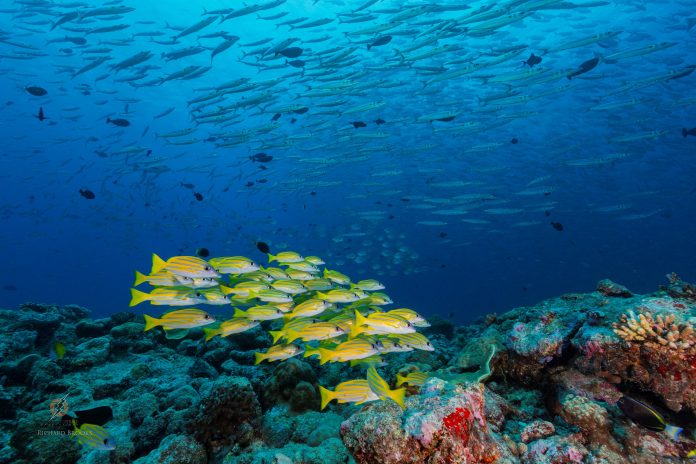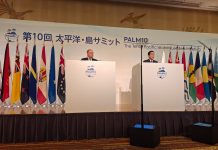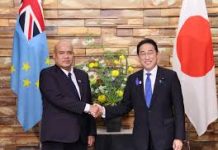Op-Ed by Levan Bouadze, Resident Representative, UNDP Pacific Office in Fiji. (Covers Federated States of Micronesia, Fiji, Kiribati, Marshall Islands, Nauru, Palau, Solomon Islands, Tonga, Tuvalu and Vanuatu)
The Blue Pacific defines who we are as Pacific people and our relationship with the vast oceans that make up our environment and the place we call home.
This biggest ocean in the world is a source of food, health, communications, and means of living since time immemorial. Safeguarding the oceans is not a new issue. However, the climate challenge discussion has led to its re-emergence as a critical matter for discussion.
As underpinned in the UN’s 2030 Agenda for Sustainable Development, the ocean is a stand-alone development goal with SDG 14 to conserve and sustainably use the oceans, seas and marine resources for a secure, and better future.
Covering more than 70 percent of the earth’s surface, oceans have a profound impact on our way of life, defining our identity, providing for people’s livelihoods, and food, regulating the weather and generating trillions of dollars for the world’s economy.
From this economy, men, women and youth benefit differently and unequally. Women make up around half of the workforce in the fishery sector, but they are usually employed in the informal sector and their contribution to livelihoods and conservation remain invisible.
At the Seventh ‘Our Ocean Conference’ in Palau, the mindset is right, focusing on the urgency to reverse ocean degradation trends and ensure continuity of life for the world’s ocean population including the Pacific, the planet, and the world at large.
But this is not just about the people of the Pacific, it is about the entire human race, so this is the first bold step we must take as a region to protect our oceans, so the rest of the world can follow.
There is no venue more fitting than Palau, to take these steps of conservation. The country – is a leading oceans champion and home to one of the world’s largest protected areas of ocean, in the Pacific islands. It provides a critical opportunity to showcase regional leadership, build partnerships and raise ambitious action-oriented solutions.
While oceans governance and sustainable development is no longer a new topic in the Pacific, the Conference aims to reflect on how the Pacific (and the world at large) strategizes the health and future of our oceans.
This is a priority entrenched in the Paris Climate Agreement and the United Nations Framework Convention for Climate Change (UNFCCC) – Conference of Parties meeting outcomes that reinforces the message for a strengthened oceans protection regime, as a leading factor for tackling climate change
As part of UNDP’s commitment to ocean leadership, we have been supporting Palau with the Global Environment Facility-funded, Palau National Marine Sanctuary (PNMS) project. The project will assist Palau operationalise its National Marine Sanctuary including the development of a Five-Year Strategic Plan and Roadmap implemented for effective institutionalisation of the PNMS within management, monitoring and enforcement bodies.
We are committed to raising the security issues related to climate change and have joined with IOM to implement the Climate Security in the Pacific project, funded by the UN Peacebuilding Fund, working with the Governments of Tuvalu, Kiribati and the Republic of the Marshall Islands, including regional organizations such as the Pacific Islands Forum (PIF), and the Pacific Climate Security Expert Network (PCSN) to address climate-related security risks and build resilience capacities of Pacific Small Island Developing States.
Supporting atoll communities, and especially women and youth, that depend on the ocean and its ecosystem for livelihoods, this initiative helps map solutions for a climate-secure future. The project will also support dialogue and mediation on disputes related to food security (agriculture, and fisheries), and maritime boundaries and EEZs.
Oceans are connected to the stability and security dynamics in the Pacific, and climate change is posing serious threats to the ocean-driven security challenges. Most of the time, Pacific women, as well as youth, people with disabilities and elderly, are more vulnerable to the impact of climate change.
Women are often responsible for water collection. When sea levels rise, cultivable land decreases as well as fresh water, affecting women and girls that will spend more time collecting water for their families. UNDP prioritises the needs of women and most vulnerable groups, in particular when addressing risk management strategies.
But to protect the oceans takes the proverbial village, and on that front much work on the oceans has been a collective effort with development partners including UN agencies, international organisations, CROP agencies, civil society organisations, private sector, donors, community groups and stakeholders.
The goal is simple, no one should be left behind, as inclusivity and equality are crucial to strengthen ocean governance, management and conservation. Pacific Island Forum Leaders have played a significant leadership role in advancing a global ocean policy, negotiated a common cause on oceans that has resulted in global best practices, and strengthened climate security among others.
As we make progress, let us continue to remind ourselves of our shared responsibility to protect the Ocean – now and for generations to come. We can only achieve our goals by working together.
Disclaimer: This Op-Ed piece represents the views of the author and not PACNEWS


















